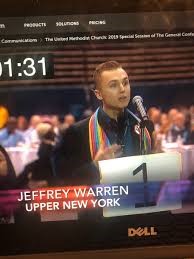Dear Rev. Roberts,
It is with regret that I request to withdraw my membership in the United Methodist Church. I will continue to attend and financially support the congregation that has welcomed me just as I am, rather than the church that tells me what I should be.
 I have struggled to become reconciled with my church ever since my partner in 1967 was told to drop out of seminary because he was gay and had no promise within the Methodist Church. I observed the witch hunt trial of Gene Leggett in San Antonio in 1976 that became a public spectacle and an embarrassment to the church. Subsequent clergy trials have occurred depending upon the arbitrary opinions of the local bishops, who can choose how to enforce the Book of Discipline. The resolution of these trials is capricious and inconsistent, and a trial often is ignored if a person is willing to lie. If our church is willing to prevent from ordination an outstanding young preacher such as Jeffrey Warren, who is reaching out to spread the good news to unbelievers, then it has the wrong priorities. (His presentation at General Conference was shared 516,560 times on social media just in case you thought he had no impact.)
I have struggled to become reconciled with my church ever since my partner in 1967 was told to drop out of seminary because he was gay and had no promise within the Methodist Church. I observed the witch hunt trial of Gene Leggett in San Antonio in 1976 that became a public spectacle and an embarrassment to the church. Subsequent clergy trials have occurred depending upon the arbitrary opinions of the local bishops, who can choose how to enforce the Book of Discipline. The resolution of these trials is capricious and inconsistent, and a trial often is ignored if a person is willing to lie. If our church is willing to prevent from ordination an outstanding young preacher such as Jeffrey Warren, who is reaching out to spread the good news to unbelievers, then it has the wrong priorities. (His presentation at General Conference was shared 516,560 times on social media just in case you thought he had no impact.)
Over the years it has become apparent to many that the United Methodist Church is more interested in maintaining the status quo and appealing to leaders who represent a conservative class of older members who have the most money. The debate is not about a cultural divide; it’s about political power. The Methodist Church was envisioned by John and Charles Wesley as an evangelical movement, but it was never fundamentalist in its interpretation of the Bible. After 14 years of serving as a co-leader of a weekly Bible study, I am still growing in my knowledge of the scriptures and also how to interpret them for the 21st Century. The fundamentalists cannot say the same. Love the sinner, hate the sin is still a statement of judgment. This struggle is not an interpretation of scripture over which we can amicably disagree. It has consequences.
This long debate about dogma has alienated not only the LGBT community from the church but also many others who see the church as focused more on self-righteousness than service. According to the UMC polls of the current generation, the Methodist Church has become irrelevant to their lives. The church has become an archaic institution that holds no promise of salvation unless we are in strict conformity with a 19th Century dogma. The Special Session of General Conference passed the Traditional Plan enforcing the restrictions of the 2016 Book of Discipline. Some are hopeful the plan will be overturned by the Judicial Council. If that occurs, we still will have the status quo. That is unacceptable to me. We are not petty children who have been hurt because we lost a game. We have suffered shame and abuse, sometimes murder, from those who claim to act in the name of God. As the Special General Conference demonstrated, the priorities of the church have changed, and evangelism is near the bottom of the list. Doctrinal purity is foremost.
At 83, I now believe that reconciliation with my church is not possible and that the established order will continue for the foreseeable future. I also have withdrawn my participation in the Reconciling Ministries Network and the North Carolina Chapter. The church hasn’t listened to our pleas. I can’t continue to participate in an exercise in futility. The Bishop’s periodic sessions of dialogue have served only to talk the issue to death with no real progress. I don’t want to hear another endless debate of the “issue.” I am not an issue; I am a person. If the church cannot accept me just as I am, then it has no place for me.
Sincerely,
John Suddath
cc: Gray Southern
Hope Morgan-Ward
Helen Ryde